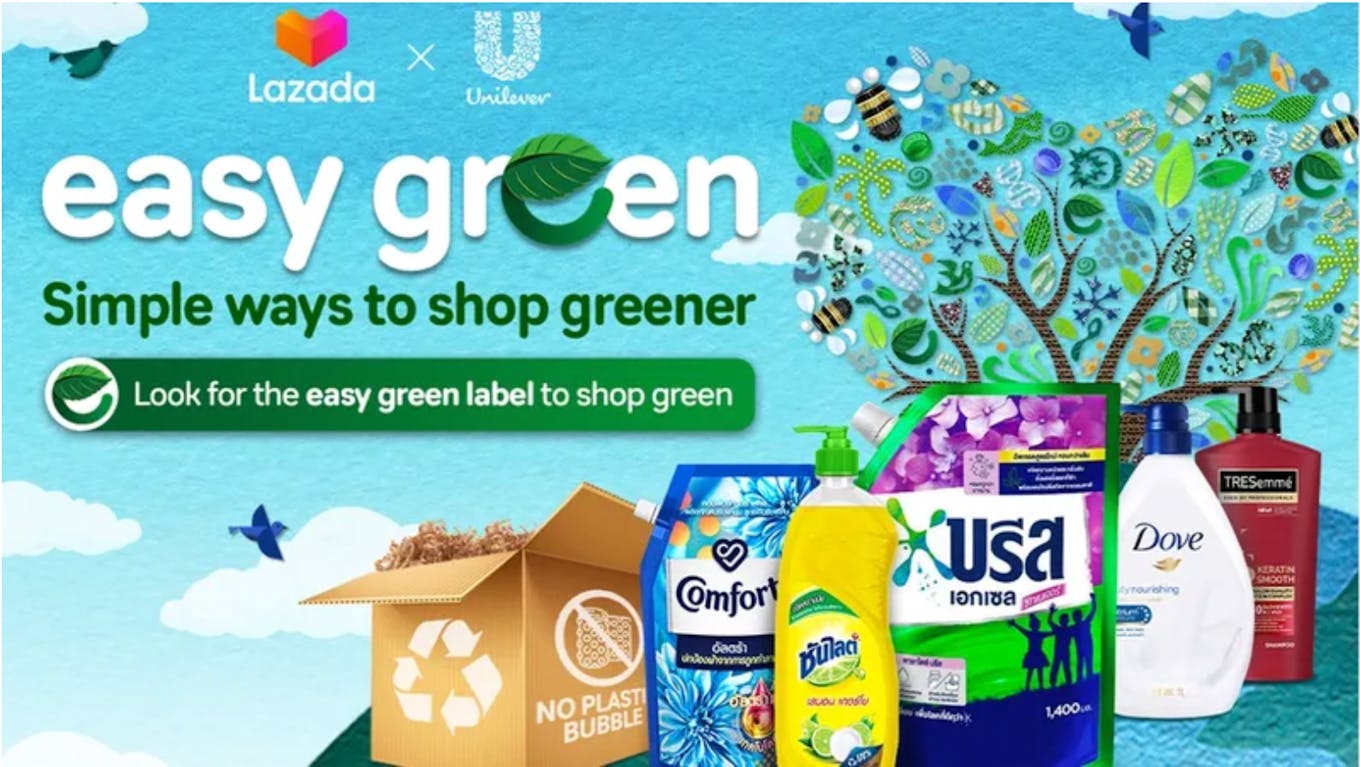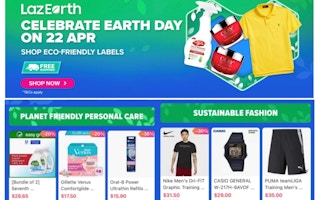A sales promotion launched by a Southeast Asian e-commence company has been called into question for labelling disposable, plastic-packaged products as “sustainable” as part of a campaign launched on Earth Day, designed to demonstrate support for environmental protection.
To continue reading, subscribe to Eco‑Business.
There's something for everyone. We offer a range of subscription plans.
- Access our stories and receive our Insights Weekly newsletter with the free EB Member plan.
- Unlock unlimited access to our content and archive with EB Circle.
- Publish your content with EB Premium.
The LazEarth campaign, launched by Singapore-headquartered e-shopping giant Lazada on 22 April, grouped 5,000 products into a new “eco-friendly” section of its online mall, which was available to the platform’s users in Indonesia, Malaysia, the Philippines, Singapore, Thailand and Vietnam.
Sustainability experts said that many of the products advertised as “planet-friendly” on Lazada are plastic disposable everyday products, and promoting and discounting such items does little to ease Southeast Asia’s waste problem.
The discounted items were mainly consumer and fashion goods made, packaged or shipped with reduced, recycled or “better” plastics, which Lazada defines as plastics that are widely recyclable.
Among the items labelled green were Gillette women’s razors, Oral-B electric toothbrushes, Unilever plant-based liquid detergent, Nike polyester training t-shirts and Casio watches. These are not easily recyclable, sustainability experts said.
The promotion only ran on Earth Day. A click to shop for Lazada’s “eco-friendly” labels now leads to a flash sale, and LazEarth-tagged products are no longer searchable on the site.
Lazada Group’s chief strategy officer Magnus Ekbom said the campaign was “part of Lazada’s ongoing efforts to address plastic waste and help our buyers make informed decisions about sustainable products.”
One of the participating companies was consumer goods firm Unilever, which launched its own “Easy Green” labelling scheme on Earth Day for homecare products sold on Lazada that it says are “biodegradable, renewable, or use better, less or no plastic.”
The pilot scheme is being tested on Lazada, and will continue to run based on results, Unilever told Eco-Business.
“
Earth Day shouldn’t be about buying more. It should be a reminder to use less.
Gwyneth Fries, expert senior manager, sustainability, Bain & Company

Unilever’s ‘Easy Green’ labeling system marks products on Lazada made with less plastic, lower emissions or biodegradable materials. Image: Unilever
Unilever said it launched the scheme “in response to the fact that limited availability, insufficient green labeling, and the excessive use of plastic packaging were the top barriers of being an eco-green shopper in Southeast Asia.”
The initiative included prize giveaways of Easy Green-marked products to the biggest spenders on Lazada on Earth Day.
‘Obvious greenwash’
Bjorn Haugland, co-founder of Skift, a network of low-carbon companies, said the campaign was “obvious greenwash” and breaks the first rule in the Guide against greenwashing, which he authored last year — be honest and accountable.
Brands should avoid using words like “green” or “sustainable” without explaining how they qualify, and ensure that these claims can be verified, he said. “I see no evidence that these products are planet-friendly.”
The founder of a Singapore-based waste reduction consultancy, who spoke on the condition of anonymity said the criteria used to label products are “extremely loose” with no clear explanation as to what level of recycled content or reduced plastic constituted a green product.
“Substantial marketing efforts were built on very loose sustainability criteria. However, we will note that this initiative is intended to be for one day only, so should be seen more as an awareness campaign rather than an ongoing attempt to greenwash consumers,” he said.
Gwyneth Fries, expert senior manager, sustainability at consulting firm Bain & Company, said the campaign does not help to advance sustainability, and pointed to a recent study that found that Asian consumers are as concerned about sustainability as in the West, but they expect brands to take the lead.
“Brands have a duty to guide consumers responsibly. Earth Day shouldn’t be about buying more. It should be a reminder to use less,” she said.
Brands respond: a sign post for sustainability
In response to queries from Eco-Business, Lazada said the intiative was “a sign post” for consumers to find sustainable products, and the initiative aimed to raise awareness of green consumerism, both among consumers and business partners in Southeast Asia.
LazEarth is “just a start — a seed that needed to be planted”, said the company’s spokesperson, adding that the data from the campaign would be analysed to identify consumer preferences and attitudes towards sustainable products.
They added that the campaign focused on high-use daily necessities, because consumers would purchase them anyway, and buying reduced or better plastic products would help curb plastic waste.
Unilever acknowledged that plastic waste is a problem, but said that cutting out plastic completely is not the solution. “We need to radically reduce our use of it, and recycle and re-use the plastic we need,” said Ed Sunico, vice president of communications, Southeast Asia, for Unilever.
“While we understand the hesitation from observers regarding whether this effort will truly yield positive results, we are committed to building partnerships and opportunities that connect our sustainable brands with eco-conscious shoppers,” he said.
Unilever, which is regularly identified among the world’s biggest plastic polluters, has pledged to make all of its packaging recyclable, reusable or compostable by 2025, and increase the proportion of recycled content in its products and packaging to 25 per cent by 2025 from 11 per cent in 2020.
“There’s a long way to go in making sustainable choices more commonplace, but we hope that through Easy Green, we can enable people to take their first step in this direction,” said Sunico.
E-commerce under scrutiny
Southeast Asia is the world’s fastest growing e-commerce market, with sales projected to increase from US$37 billion in 2019 to US$90 billion by the end of this year.
In Singapore alone, an estimated 200,000 parcels are delivered via e-commerce platform every day, a number that is expected to grow by 50 per cent by 2025. A third of Singapore’s domestic waste comes from packaging.
E-commerce firms have been trying to improve their sustainability credentials, as awareness grows about the contribution the sector makes to consumption, emissions and waste. Lazada ran a campaign to reduce plastic packaging material for last year’s Singles Day, an annual e-shopping festival, and says it cut packaging volumes by two-thirds.
Lazada’s owner, Alibaba, has pledged to be carbon neutral by 2030. The firm is also aiming for Lazada, Southeast Asia’s second most popular e-commerce player, to grow from 159 million monthly active users and US$21 billion in gross merchandise value (GMV) in 2021 to 300 million consumers and US$100 billion in GMV by 2030.
Alibaba was ranked first by Greenpeace in a review of climate action by Chinese e-commerce platforms in December.








